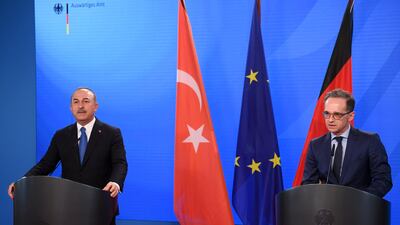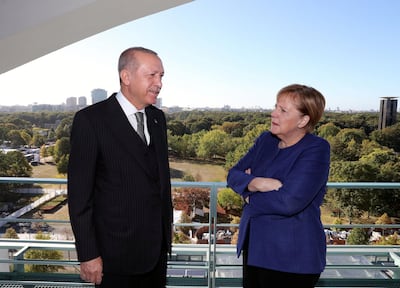Relations between the EU and Turkey are looking up this year but Ankara must make its case for closer ties with the bloc, Germany’s foreign minister said.
Heiko Maas made the remarks a day after German Chancellor Angela Merkel told Turkey to send an "important signal" by pulling its forces out of Libya.
Asked what more Berlin could do to support Ankara’s longstanding bid to join the EU, Mr Maas said: “Turkey can contribute the most.”
“We know ... that we are interested in these talks, and of course in goals and results,” he said in the German capital during a visit by his Turkish counterpart, Mevlut Cavusoglu.
“Last year was a difficult year in the relationship between the EU and Turkey. This year looks to be a much better one.”
Mrs Merkel spoke to Turkish President Recep Tayyip Erdogan on Wednesday and told Ankara to withdraw its troops from Libya to bolster the unity government led by Abdul Hamid Dbeibah before elections planned for December.
“The Chancellor emphasised that an early start of the withdrawal of foreign soldiers and mercenaries would send an important signal,” Mrs Merkel’s spokesman said.
Turkey sent troops to Libya during a decade of violent chaos that ended with a ceasefire last year.
Ankara says it agrees “foreign fighters and mercenaries” should leave the country, but it insists it has a bilateral agreement with Tripoli for its military troops to be stationed there.
“I think that foreign mercenaries and the legitimate presence there should not be confused,” Mr Cavusoglu said on Thursday.
Ankara clashed with European leaders last year on various issues, including Syria, gas exploration in the Eastern Mediterranean and cartoons of the Prophet Mohammed.
EU leaders agreed in March to provide more money for refugees hosted in Turkey, and in April Mr Erdogan said his country remained committed to obtaining EU membership.
But efforts to improve ties were set back by a bizarre row after European Commission chief Ursula von der Leyen was relegated to a sofa on an official visit to Ankara.
Turkey under pressure to pull its troops from Libya
Mr Dbeibah's Libyan government was sworn in on March 15 with backing from international powers including the EU and US.
It replaced the two warring administrations that ruled eastern and western regions in the aftermath of the Nato-backed uprising that removed Muammar Qaddafi in 2011.
Turkey had backed the Tripoli-based Government of National Accord against the eastern-based Libyan National Army, which was supported by Russia, Egypt and others.
Ankara, which also sent thousands of Syrian fighters to Libya, said in February it would consider withdrawing its forces from Libya if other foreign troops left first.
The Biden administration in January accused Russia and Turkey of breaching the ceasefire deal under which all foreign troops and mercenaries were to leave Libya.
G7 foreign ministers discussed Libya’s future during their three-day talks in London this week, their first in-person meeting since the onset of the pandemic.
After the G7 talks, US Secretary of State Antony Blinken said he had renewed Washington’s support for new elections in December.
“We stand with the Libyan people to find a UN-facilitated political solution to the conflict,” he said on Tuesday.
The EU's foreign policy chief Josep Borrell said Libya was one of the bright spots among a series of global issues discussed by G7 diplomats.
“Libya is good news. The ceasefire is still lasting and I think that we can be optimistic about the situation,” he said.
“So, you see, in general terms things are not going better, but there are some places, Iran can be one of them, Libya another, where we can have certain hope that things will improve.”



